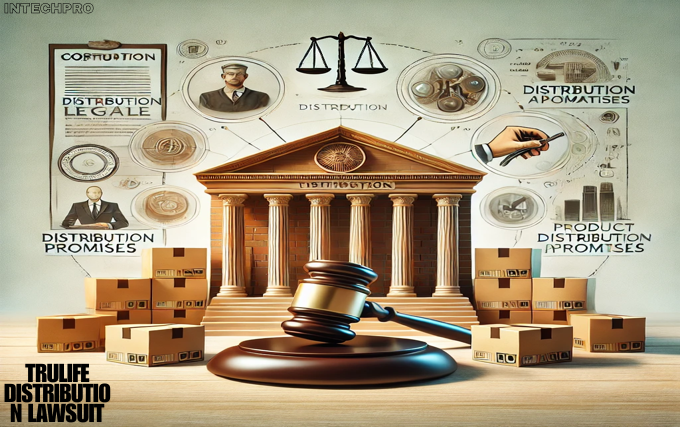In recent years, Trulife Distribution has gained considerable attention in the health and wellness sector. As a company that offers distribution services to supplement, beauty, and wellness brands, it has carved a niche for itself by helping businesses reach larger audiences. However, like many companies in this industry, Trulife Distribution has encountered legal challenges, sparking curiosity and concern among clients, partners, and the general public. This article aims to provide a comprehensive overview of the Trulife Distribution lawsuit, its implications for the company, and its potential impact on the industry.
What is Trulife Distribution?
Trulife Distribution is a company specializing in the distribution of health, wellness, and beauty products, catering to various brands that seek to expand their market reach. Founded with the mission to provide effective, reliable, and comprehensive distribution services, Trulife Distribution has partnerships with brands that focus on dietary supplements, skincare, and health-related products. The company’s services include logistical support, marketing assistance, and an extensive distribution network across North America and globally, helping brands to get their products on store shelves and in front of consumers.
By providing marketing and logistical support, Trulife Distribution enables smaller brands to compete with established players in the health and wellness industry. This strategy has made Trulife Distribution a respected name among emerging brands, but it has also put the company under the microscope for certain practices, leading to recent legal action.
Overview of the Trulife Distribution Lawsuit
Nature of the Lawsuit
The legal case involving Trulife Distribution generally revolves around allegations related to business practices, contractual agreements, or industry compliance. The exact details of the lawsuit may differ depending on the claims made by the plaintiffs, but the accusations commonly involve issues such as false advertising, failure to fulfill contract terms, or misrepresentation of services. Lawsuits in the health and wellness distribution sector often include complaints from brands that allege that the distributor did not deliver on promised services, resulting in financial loss and potential damage to brand reputation.
Parties Involved
In lawsuits involving distribution companies like Trulife, the plaintiffs are typically brands or former clients who entered into distribution agreements expecting certain results. Some lawsuits may also involve regulatory agencies, especially if the accusations touch on compliance with industry standards and consumer safety regulations. Defendants in the case include Trulife Distribution and possibly other related entities, such as executives or employees who may be implicated in the alleged activities.
Legal Claims
While each lawsuit is unique, common legal claims in cases involving distributors include:
- Breach of Contract: If Trulife Distribution failed to meet the terms outlined in its agreements with clients, it could be accused of breaching those contracts.
- Misrepresentation or Fraud: Some lawsuits allege that distribution companies misrepresented their capabilities or services to clients, leading them to believe they would receive services that were not delivered.
- Unfair Trade Practices: Plaintiffs may claim that Trulife engaged in practices that violate consumer protection laws or mislead clients, which can be grounds for legal action.
Key Events Leading Up to the Lawsuit
The events that lead up to lawsuits in the distribution sector often follow a predictable pattern. Below are common steps that may have occurred in Trulife Distribution’s case:
- Initial Contractual Agreements: Brands seeking distribution services contract with Trulife Distribution based on mutually agreed-upon terms, outlining services, timelines, and expectations.
- Unmet Expectations: Brands may feel that their products are not gaining the promised exposure or that Trulife Distribution has not provided adequate marketing support.
- Formal Complaints: After multiple attempts to resolve issues directly, dissatisfied clients may escalate their complaints. This may involve reaching out to regulatory bodies, such as the Federal Trade Commission (FTC), or initiating a lawsuit.
- Filing of Lawsuit: Once formal complaints fail to yield results, plaintiffs may proceed with a lawsuit, seeking compensation or corrective action.
Potential Impact on Trulife Distribution
Financial Consequences
Lawsuits are typically costly for companies, both in terms of legal fees and potential settlements or fines. If Trulife Distribution is found liable for any of the claims, it may face significant financial repercussions, potentially including compensatory damages to plaintiffs, penalties for non-compliance, and reimbursement of legal costs. These financial burdens could impact Trulife’s operations, leading to a reduction in resources or scaling back on expansion plans.
Reputation and Client Trust
In the distribution industry, trust and reputation are vital assets. Lawsuits can tarnish a company’s image, especially if the accusations involve fraud or misrepresentation. Current and potential clients may reconsider their partnership with Trulife Distribution if they perceive it to be unreliable or unethical. Rebuilding trust after a lawsuit can be challenging, requiring extensive public relations efforts and possibly restructuring business practices to assure clients of future reliability.
Operational Changes and Compliance
Companies facing legal issues often need to reassess their operational practices, especially if the lawsuit reveals compliance or procedural shortcomings. For Trulife Distribution, this could mean revisiting contract terms, improving transparency with clients, or investing in compliance training. By addressing the root causes of the lawsuit, Trulife can improve client satisfaction and reduce the risk of similar issues arising in the future.
Legal and Industry Implications
Regulatory Scrutiny
Lawsuits in the health and wellness industry, especially those involving distribution practices, often draw the attention of regulatory bodies. Agencies such as the FTC and the Food and Drug Administration (FDA) monitor the distribution of health-related products to ensure that companies follow advertising and labeling regulations. Trulife Distribution may face increased scrutiny and potential inspections to ensure compliance with industry standards, especially if the lawsuit involves allegations of misleading advertising.
Influence on Industry Standards
High-profile lawsuits can also lead to broader changes within the industry. If Trulife Distribution’s case highlights widespread issues with distribution practices, it could prompt industry associations to establish stricter guidelines for distributors. These standards may address transparency in service offerings, fair contract terms, and clearer communication between distributors and clients, ultimately benefiting the industry as a whole by improving business practices.
Impact on Small and Emerging Brands
Many smaller brands rely on distributors like Trulife to gain market exposure. Lawsuits against distributors can create uncertainty and concern for these brands, which may struggle to find alternative partners or feel wary of entering similar agreements. This lawsuit may encourage small brands to conduct more thorough due diligence before committing to distribution partnerships, ensuring that the distributor has a positive reputation and a proven track record of meeting clients’ expectations.
Steps Trulife Distribution Can Take Moving Forward
Transparent Communication with Clients
One way for Trulife Distribution to regain trust is by improving its transparency with clients. This includes setting realistic expectations about distribution outcomes, clarifying contract terms, and providing regular updates on product placement and marketing efforts. By fostering open communication, Trulife can minimize misunderstandings and reinforce its commitment to client satisfaction.
Compliance Audits and Employee Training
Compliance audits can help identify any gaps in Trulife’s practices, allowing the company to address these issues proactively. Training employees on regulatory standards, such as proper advertising guidelines, can further reduce the risk of future lawsuits. This strategy not only ensures compliance with industry regulations but also demonstrates a commitment to ethical business practices.
Building a Stronger Online Reputation
Reputation management is essential in the age of social media and online reviews. Trulife Distribution can focus on building a positive online presence through client testimonials, case studies, and social proof of its successful partnerships. Highlighting satisfied clients and showcasing successful product placements can help mitigate the impact of negative publicity from the lawsuit.
Lessons for Other Companies in the Industry
The Trulife Distribution lawsuit serves as a reminder for other companies in the health and wellness industry about the importance of ethical business practices and transparent client relationships. Companies can learn from Trulife’s experience by prioritizing:
- Clear Contractual Agreements: Avoiding vague terms in contracts can reduce disputes and ensure that both parties have a mutual understanding of expectations and deliverables.
- Proactive Compliance: Staying updated with industry standards and regulations minimizes legal risks and reinforces a company’s commitment to ethical practices.
- Client-Centric Approach: Providing personalized support and regular communication strengthens client relationships and fosters long-term loyalty.
Conclusion
The Trulife Distribution lawsuit highlights both the challenges and responsibilities that come with being a distribution company in the health and wellness industry. As the case unfolds, its outcome may not only impact Trulife Distribution’s future but could also influence broader industry practices. The lawsuit underscores the importance of maintaining transparency, regulatory compliance, and ethical business practices to protect a company’s reputation and build trust with clients.
For Trulife Distribution, this case offers an opportunity for reflection and improvement, potentially setting the stage for better client relations and operational strategies moving forward.


